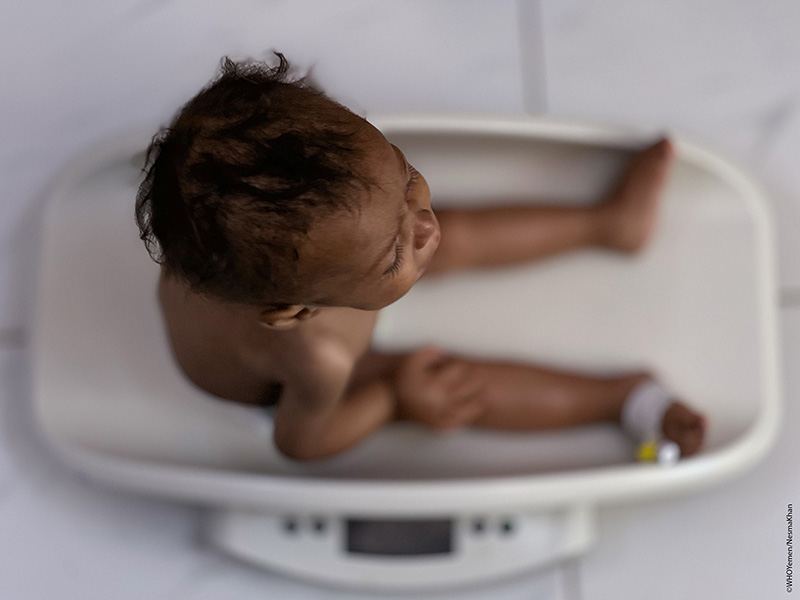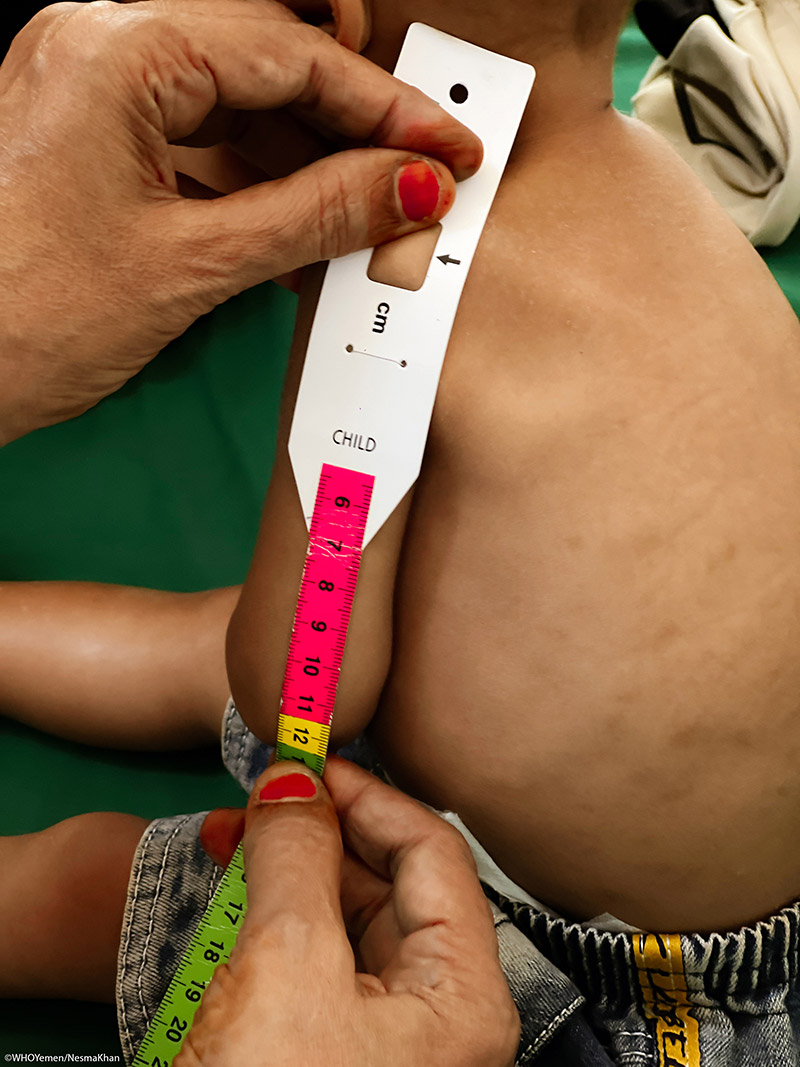 28 August 2024, Aden, Yemen – Mohamed Khalil a 2-year-old boy from Al-Khawkhah district in Hodeida, suffers from severe acute malnutrition with medical complications. His belly is swollen and his body is frail. When he began vomiting every time he ate, his mother scraped together what money she could from family and friends and took him to Al-Saddaqa Hospital in Aden.
28 August 2024, Aden, Yemen – Mohamed Khalil a 2-year-old boy from Al-Khawkhah district in Hodeida, suffers from severe acute malnutrition with medical complications. His belly is swollen and his body is frail. When he began vomiting every time he ate, his mother scraped together what money she could from family and friends and took him to Al-Saddaqa Hospital in Aden.
Mohamed’s mother has 4 children, the youngest just 4 months old. She struggles to feed her family. As the prices of basic food items continue to rise, it becomes daily more difficult to make ends meet. “The cost of living is becoming unbearable. We can barely afford enough food for everyone," she says.
Despite these hardships, she is determined that Mohamed gets the care he needs.
"The doctors at the hospital are kind. They provide milk for free, medicines, lab investigations, and meals for me but we still need to pay for additional specialized tests. I don’t know how we will manage. I just want my son to get healthy, but it’s distressing when I can’t afford everything he needs.”
The August 2024 Integrated Food Security Phase Classification (IPC) report revealed that 50% of the population in Yemen’s southern governorates face acute food insecurity. The situation is exacerbated by reduced humanitarian aid and economic decline. The depreciation of the Yemeni Riyal has increased fuel prices and compounded already limited access to food.
The high prevalence of diseases such as cholera and measles, limited access to safe water, and inadequate sanitation contribute to worsening nutritional and medical conditions, while the displacement of populations and loss of livelihoods due to conflict place additional strains on Yemeni families.
Faiza Al-Maktari, a nurse in the nutrition department at Saddaqa Hospital, represents hope for families desperately seeking care for their children. Faiza says her work blends joy and sadness and speaks of “holding a frail baby and watching them recover” as akin to “witnessing a small miracle”.
 Her department is stretched to breaking point as increasing numbers of malnourished children from nearby governorates, especially the West Coast region, strain essential supplies, leaving the staff to cope with decreasing resources. Despite the challenges, Faiza remains undeterred. She dedicates time to comforting anxious mothers, offering a listening ear and kind words.
Her department is stretched to breaking point as increasing numbers of malnourished children from nearby governorates, especially the West Coast region, strain essential supplies, leaving the staff to cope with decreasing resources. Despite the challenges, Faiza remains undeterred. She dedicates time to comforting anxious mothers, offering a listening ear and kind words.
“I try to give them hope,” she says. “Sometimes, a little kindness goes a long way.”
The 7 supported therapeutic feeding centres (TFC), 4 of them embedded in pediatric wards, operating in regions with high malnutrition rates, high levels of internal displacement and severe food insecurity, provided lifesaving services to over 5129 children between October 2023 and July 2024, addressing acute malnutrition cases with serious co-morbidities.
The TFCs offer round-the-clock, lifesaving health and nutrition care for severely malnourished children. Sustaining these services is vital to saving children’s lives. To alleviate the financial burden on families, caregivers receive cash support for transportation, and three meals a day during the admission period, and the costs of lab tests and admission kits are fully covered.
Faiza dreams of a Yemen where no child goes hungry, and families find stability and peace.
“I’m grateful to be here, to help any way I can,” she says. “But I long for a future where our work isn’t so desperately needed.”
Leaving the hospital each day, Faiza carries with her the memories of those she has helped and those she has lost. The memories fuel her resolve to return, day after day, striving to make a difference.
“It’s never easy, but I won’t give up. Not now, not ever.”
In collaboration with the European Civil Protection and Humanitarian Aid Operations (ECHO), WHO is dedicated to enhancing child health and well-being while reducing mortality and morbidity through a protective, integrated approach. WHO supports 101 therapeutic feeding centres across Yemen, covering approximately 80% of the target caseload in the country.
WHO assists the Ministry of Public Health and Population and other partners by providing technical capacity building for case management and supplying essential medical supplies, including pediatric and severe acute malnutrition kits.


